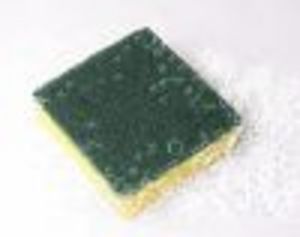They’re an important part of your kitchen, but household sponges can be a source for a variety of not so friendly bacteria. Would you believe the average kitchen sponge may harbor billions of these tiny microorganisms and when you use your sponges you’re wiping them all over your counter and appliances? It’s enough to cause you to rethink the way you care for your kitchen sponges. The good news is that proper sponge care can reduce your risk of turning your kitchen into a haven for bad bacteria. Here’s how to keep clean kitchen sponges:
Care for sponges: Clean and dry your sponge thoroughly after every use
A damp sponge is a breeding ground for bacteria. After using a kitchen sponge, wring out the soapy water and rinse it thoroughly in hot water. Squeeze the sponge to remove as much water as possible and place it in a warm, dry area to thoroughly dry. Never leave a wet soapy sponge on the kitchen counter.
Care for sponges: Be careful how you use your kitchen sponge
If you’re working with food materials that may potentially harbor bacteria such as raw meats or eggs, avoid using a clean kitchen sponge as it may pick up the bacteria and infect other parts of your kitchen. In these situations, it’s best to stick with paper towels which you can dispose of immediately.
Care for sponges: Use your microwave to disinfect a kitchen sponge
One of the most effective ways to clean kitchen sponges is to zap it for two minutes in a microwave. This brief time in a microwave is enough to kill ninety-nine percent of the bacteria that may be living in the crevices of a kitchen sponge. If you don’t have a microwave, a second alternative is to wash your sponge in hot water in your dishwater, but this may not be as effective as the microwave technique.
Care for sponges: Have plenty of supplemental kitchen sponges available
If microwaved regularly, a sponge can be kept until it’s no longer viable or until it develops an odor. If you clean your sponges in your dishwasher, it’s best to replace them every two weeks or sooner if you notice a smell. A sponge with an odor almost surely has some bacterial growth that requires replacement.
Care for sponges: Select the best kitchen sponges
These days there are sponges that have been designed to reduce the incidence of bacterial growth. These modified sponges generally have this fact advertised on their packaging. Look for these special sponges at your grocery store the next time you go shopping. Although these sponges are less likely to harbor high quantities of bacteria, they should still be disinfected in the microwave regularly.
Keeping your kitchen sponges clean and disinfected can help to reduce the risk of transmitting illness to you and your family. Why not use these simple techniques to keep your sponges clean and bacteria free?
